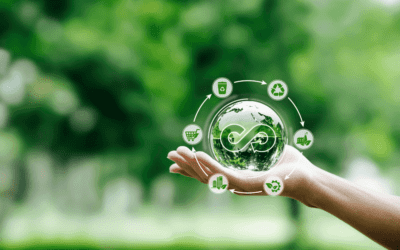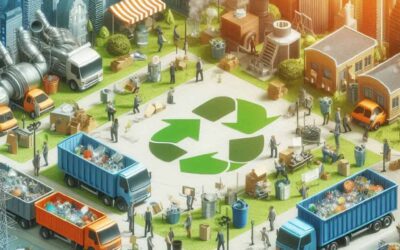At the end of August this year, the UK’s Chartered Institute of Wastes Management (CIWM) announced the winners of Circular Economy Innovators funding. Six companies won marketing, brand and communications support of a value of up to £10,000, in a competition that’s designed to support the growth of high potential small businesses.
This, alongside other competitions such as the Earthshot Prize, which has a dedicated category for companies working towards a waste-free world, shines a spotlight on those innovators and entrepreneurs who are looking for ways to take our waste and turn it into useful and profitable products.
What’s happening with waste?
There are many great examples of businesses or organisations that are transforming waste into something far more valuable.
Ferment’Up is a product developed by Green Spot Technologies, and was a finalist in the ‘Build a waste-free world’ category in the 2024 Earthshot Prize. This project looks at the nutrient-rich food waste that is dumped in landfill, and also at the amount of energy used to produce traditional cereal crops.
Ferment’Up uses a dry fermentation process that transforms commercial food processing waste into sustainably-produced ingredients like flour and tomato concentrate. At the point of entering the competition, the process had diverted 150,000kg of vegetables from landfill, and prevented 235 tonnes of CO2 emissions.
In the CWIM awards, MarinaTex has developed a home-compostable alternative to plastic film. The company won a James Dyson Award in 2019. The product uses waste from the fish processing industry, particularly fish skin and scales, alongside agar from red algae. Red algae is naturally carbon-neutral, and the fish waste would otherwise be discarded. Still in the research stage, MarinaTex believes that its product is potentially stronger than existing plastic film and will be completely compostable, helping to reduce plastic waste once it is on the market.
Supporting innovative waste research
We simply can’t continue to throw away as much as we do. And we also can’t continue to mine the planet for new materials and resources. There is a tipping point and we’re not far from it. So supporting the transformation of waste to useful products is an essential part of a move to a circular economy.
What we need is the ability to create sustainable products and materials so that we reduce the demand for new plastics and other products whose manufacture and use harms the planet. There have been innovations in waste management and reuse for many years – some more successful than others – and both public and corporate awareness of these issues means that there is a consumer demand for more sustainable products, and a growing corporate desire to meet that demand.
There’s a steady increase in both research and practical application for waste transformation. Often institutions and business work together to take research outcomes and develop them into commercial products or systems.
For example, at the US Department of Energy’s Argonne National Laboratory, a research team is working on new methods for managing plastic waste. Scientists there have developed new ways to recycle plastic into lubricants and waxes. The Laboratory’s ReCell Center focuses on battery recycling, bringing valuable materials such as lithium, nickel and cobalt back into the materials chain – reducing the need for resource mining.
These, and other significant research and industry collaborations around the world are focused on how to turn our trash into treasure. As an article on the University of Chicago website says:
“This means viewing landfills less like putrid, mountainous eyesores and more like massive treasure troves waiting to be mined for their stores of valuable materials.”
It’s true that, as these technologies improve, we’re likely to actually start mining landfills instead of fresh ground. Using the waste that we’ve already created and turning it into something new is one of the best ways we can tackle the mounting waste problem on our planet.
At ISB Global, we allow waste and recycling management companies to collect, separate and resell materials in an cost-effective and efficient way, through our integrated software platform, Waste & Recycling One. We’re committed to contributing to a healthier planet and a functioning circular economy by support waste management companies to be at the centre of change.






